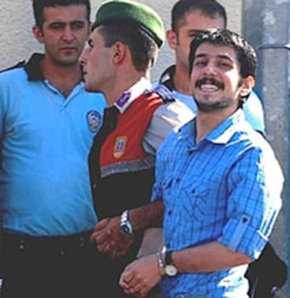The Case of Cihan Kırmızıgül
Keffiyeh Crime in Turkey
by MICHAEL DICKINSON
On February 20th 2010 Cihan Kırmızıgül, a junior industrial engineering student of Galatasaray University, was waiting at a bus stop in Istanbul after a visit to a college friend’s home. Suddenly he was approached by Turkish police who arrested him violently, one cracking his skull with a blow from his rifle butt, and took him away to be detained at a prison in the west of Istanbul, charged with “membership of an illegal organization” and “harming private property”. The reason for his surprise arrest was the scarf he was wearing around his neck – the traditional black and white checked Arab headdress known as the ‘keffiyeh’.
The keffiyeh, called a ‘poshu’ or a ‘pushi’ scarf in Turkish is also common among Palestinians and the Kurds in the South of Turkey. It’s a useful garment. It keeps your neck warm in the winter and protects your head from rain and hot sunshine. It’s not such a common sight in cosmopolitan Istanbul however, and unfortunately for Cihan Kırmızıgül, just at that moment police in the area were on the lookout for anybody wearing one. Unbeknownst to Cihan, shortly before he joined the bus queue there had been an attack on an empty supermarket in the district by a group of about 50 people who threw Molotov cocktails at the building before fleeing the scene. The assailants were suspected members of the outlawed PKK (Kurdish Workers’ Party) and all had been wearing keffiyehs.
Simply for sporting the same item of clothing (and also being Kurdish) Cihan was arrested on the suspicion that “he might have been part of the incident” and charged with being a ‘terrorist’. Whilst being held in prison custody a series of 8 court hearings began.
In the second hearing a ‘secret witness’ stated that he had seen Kırmızıgül throwing a Molotov cocktail. Later on, the secret witness changed his statement and said, “Kırmızıgül was not at the scene of the incident, I have never seen him before”. However, the court decided to keep Kırmızıgül in detention.
In the text of a petition calling for Cihan’s release fellow Galatasaray students wrote: “Kırmızıgül’s continued arrest has turned into a hefty and unjust punishment because law requires “presumption of innocence” until convincing and lawful evidence is presented in court concerning his alleged crime.”
Finally, on the 23rd March 2012, after 25 months detention in prison, where he lost weight and was subjected to physical and psychological violence, and not allowed to continue his studies or take exams, Cihan was finally released pending trial of his case. However, after less than 2 months out of captivity, at the court hearing on May 11th he was found guilty of “committing a crime on behalf of an organization without being a member of that organization”, “throwing Molotov cocktails”, and “damaging property”. He was sentenced to 11 years 3 months of imprisonment in total. The judge decreed that “The piece of cloth called “pushi” (keffiyeh) was strong criminal evidence.”
Suat Eren, Kırmızıgül’s attorney said after the trial: “There are hundreds of files like Cihan’s. For that reason, I believe Cihan’s case must be supported by the public, as such attacks continue unabated against defenseless people by relying on the powers of the state. I define this as terror. This constitutes attacking a defenseless person. People are not taken into custody at a moment’s notice, or live in fear of their houses being raided in a state of law. ”
 A spokesperson from Amnesty International said: “Anti- Terror Laws have to be changed and comply with the international standards. It’s very important to implement fair trial standards at all prosecutions in Turkey. We are very concerned as Cihan is back to prison and the hearing is based on the conflicting testimony of witnesses and the keffiyeh (Puşi) he was wearing.”
A spokesperson from Amnesty International said: “Anti- Terror Laws have to be changed and comply with the international standards. It’s very important to implement fair trial standards at all prosecutions in Turkey. We are very concerned as Cihan is back to prison and the hearing is based on the conflicting testimony of witnesses and the keffiyeh (Puşi) he was wearing.”
The case has come under widespread criticism, with protest demonstrations by supporters and sympathisers, and teaching staff from Galatasaray University wearing badges featuring the slogan “Don’t touch my student!” Famous Turkish singer Aysegul Erce has written and performed a song about the case, dedicated to Cihan Kırmızıgül – “For Justice. For Freedom..” Exactly.
Michael Dickinson lives in Istanbul. He can be contacted via his website – https://yabanji.tripod.com/
via Keffiyeh Crime in Turkey » Counterpunch: Tells the Facts, Names the Names.
